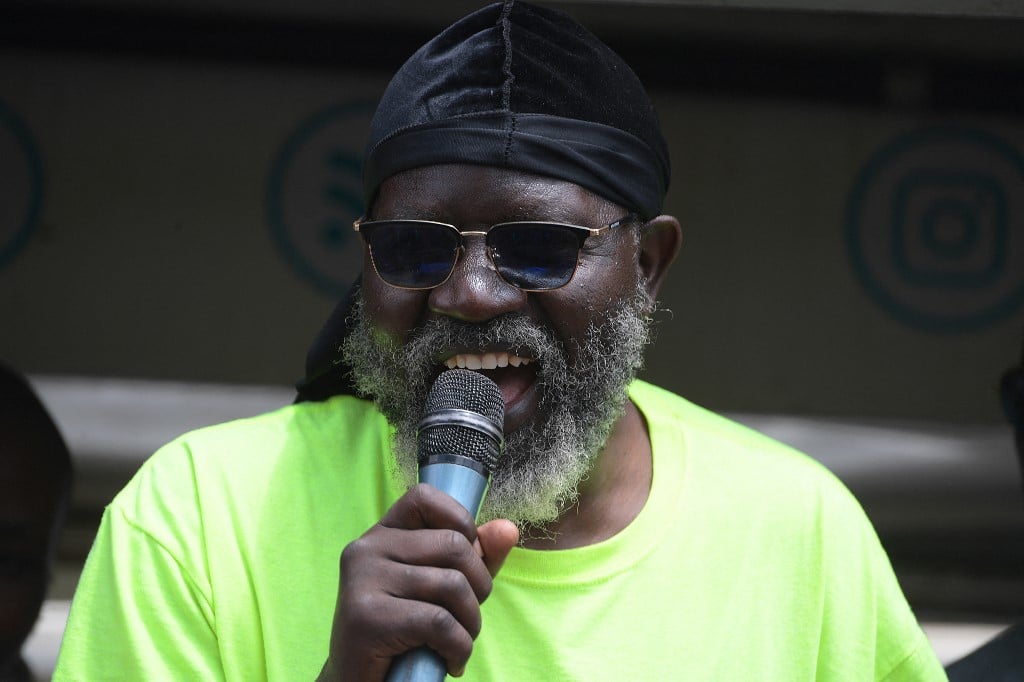On 23 June, the front cover of the Kenyan Swahili-language newspaper Taifa Leo featured a picture of the increasingly popular candidate Wajackoyah with the title: “Wajackoyah shakes Ruto and Raila up.”
But Kenyans know that Professor George Wajackoyah will not win. Along with David Mwaure Waihiga from the Agano Party, he is one of the outsiders running for president in the August election.
His presence, however, could have a profound impact on the outcome of the first-round ballot on 9 August. If one of the two frontrunners – William Ruto and Raila Odinga – does not secure 50% of the national vote, the election will be forced into a second round. If Ruto and Odinga are neck and neck, a small number of votes for the two other candidates could be decisive in denying either of them a majority.
“All they need is to jointly get something in the region of 50,000 votes, and that will be enough to tilt the balance,” wrote Macharia Gaitho in the Kenyan newspaper Daily Nation.
And the 50,000 votes are becoming more and more credible given the latest poll results.
In a recent survey across 17 Nairobi constituencies, polling agency Trends for Insights Africa (TIFA) found that Wajackoyah had an approval rating of 7%, which could translate into 150,000 votes if replicated nationwide on polling day. The same poll gave Odinga 50%, followed by Ruto with 25%.
Although it would not lead to his election, the 7% obtained by Wajackoyah highlights growing support for the unconventional candidate, especially as the same survey in May gave him 0% of the vote in Kenya’s capital.
‘Rastaman must be respected’
Wajackoyah’s unexpected popularity comes from recent publicity around his willingness to legalise cannabis. The Roots Party leader has made it the backbone of his political agenda.
Earlier this month, in a TV interview that has gone viral, Wajackoyah claimed that legalising the growing of marijuana for both recreational and medical uses would allow his government to pay off Kenya’s $12bn debt-servicing costs.
“Africa’s legal marijuana trade could be worth as much as $7.1bn by the year 2022-23. Why should Kenya be left behind?” he told his interviewer.
According to him, exporting the produce of a thousand acres of the cannabis Indica plant would bring about $3bn to the government coffers.
And the money would be kept safe under his presidency as Wajackoyah announced that he would hang anyone who steals public funds.
“I want to be an economic dictator on corruption,” he said.
“Kenya is not free. It is under siege by the political class and people who think they can give direction forever,” he added.
Among other reforms, Wajackoyah wishes to give Kenya a dominant position in the anti-venom market by encouraging snake farming. According to the Roots Party leader, snake poison is worth a fortune, and Kenya should develop the industry to pay off its Chinese debt.
Although Kenyan journalists seem rather amused by Wajackoyah’s ideas, the bearded lawyer seems to have been more of a hustler than Ruto, who has tried to portray himself as the champion of Kenya’s “hustler nation”.
In an interview for KTN news, Wajackoyah talked about his previous experience as a refugee in the UK before obtaining a law degree.
The narrative of the once poor child roaming the streets of Nairobi who became a successful lawyer increasingly attracts a youthful electorate which recognises itself in Wajackoyah’s opposition to the political elites.
Weed enters other candidates’ programmes
It will be wrong to ignore the Rastaman’s ability to change the course of the election. The support Wajackoyah gains for his idea of legalising weed is making other candidates consider it.
“The numbers Wajackoyah is giving are making sense. We are even asking Raila to consider the legislation of weed because it is making money,” said David Murathe, vice-chair of Kenya’s ruling political party Jubilee, during a TV interview.
Whether Raila Odinga looks into legalising bhang as part of a political strategy to attract the youth, or he genuinely considers its potential impact on Kenya’s economy, weed has made its mark on the presidential race.
Wajackoyah has successfully managed to bring the topic to the table. His ascension is spectacular given that a few weeks ago the so-called Rastaman was not taken seriously by his political opponents, who are now becoming inspired by his weed manifesto.
Want to continue reading? Subscribe today.
You've read all your free articles for this month! Subscribe now to enjoy full access to our content.
Digital Monthly
£8.00 / month
Receive full unlimited access to our articles, opinions, podcasts and more.
Digital Yearly
£70.00 / year
Our best value offer - save £26 and gain access to all of our digital content for an entire year!
 Sign in with Google
Sign in with Google 



